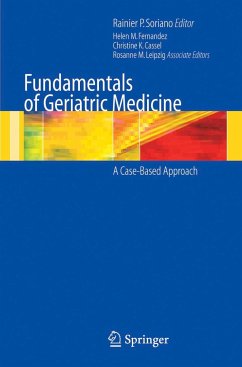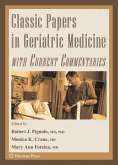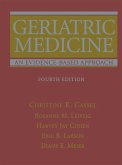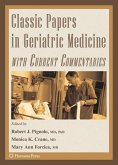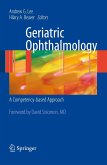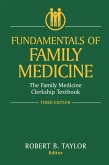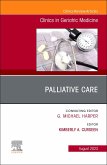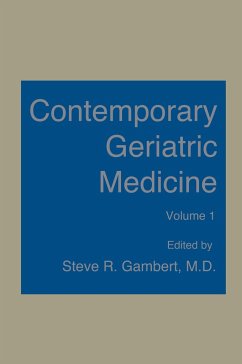This useful book distills the knowledge contained in the classic text, Geriatric Medicine: An Evidence-Based Approach, 4/e into a practical guide that empowers primary care, family medicine, and internal medicine residents to quickly apply theoretical material to clinical practice.
Prior to the evolution of modern medicine, with its superabundance of diagnostic and therapeutic medical technology and the rise of the litigious society, the value of clinical skills was evident in both history taking and the physical examination. Even today, physicians can make a correct di- nosis solely by utilizing their clinical skills in about 90% of patient enco- ters. Furthermore, in the past physicians understood their role as a "psychologist" and were more apt to be familiar with the social context of their patients. House calls were common. The doctor was also a "placebo" who, at his best, inspired hope and probably sped recovery. Geriatricians use both clinical skills and take advantage of modern technology sparingly, for they know they are dealing with the most ch- lenging and frail of patients-older patients who so often present with multiple, complex, interacting behavioral, social, and physical problems. In contrast to medicine for young people, working with the older patient is much more demanding. Furthermore, the complex issue of societal at- tudes toward old people can come into play, speci? cally the physician's need to deal with natural fears of aging, dependency, depression, dementia, and death. Ageism is the enemy of effective medical treatment. At its best, geriatrics exempli? es ways that medical care for all ages can become more humane, problem-oriented, and holistic.
Hinweis: Dieser Artikel kann nur an eine deutsche Lieferadresse ausgeliefert werden.
Prior to the evolution of modern medicine, with its superabundance of diagnostic and therapeutic medical technology and the rise of the litigious society, the value of clinical skills was evident in both history taking and the physical examination. Even today, physicians can make a correct di- nosis solely by utilizing their clinical skills in about 90% of patient enco- ters. Furthermore, in the past physicians understood their role as a "psychologist" and were more apt to be familiar with the social context of their patients. House calls were common. The doctor was also a "placebo" who, at his best, inspired hope and probably sped recovery. Geriatricians use both clinical skills and take advantage of modern technology sparingly, for they know they are dealing with the most ch- lenging and frail of patients-older patients who so often present with multiple, complex, interacting behavioral, social, and physical problems. In contrast to medicine for young people, working with the older patient is much more demanding. Furthermore, the complex issue of societal at- tudes toward old people can come into play, speci? cally the physician's need to deal with natural fears of aging, dependency, depression, dementia, and death. Ageism is the enemy of effective medical treatment. At its best, geriatrics exempli? es ways that medical care for all ages can become more humane, problem-oriented, and holistic.
Hinweis: Dieser Artikel kann nur an eine deutsche Lieferadresse ausgeliefert werden.
From the reviews:
"Fundamentals of Geriatric Medicine comprehensively covers the broad field of geriatric medicine in 624 pages. ... The bibliography at the end of each chapter is up to date ... . The book is reasonably priced ... . It provides clinically relevant information in an excellent, straightforward manner. It will be decidedly useful to medical students, residents, fellows, and primary care clinicians (physicians, nurse practitioners, and physician assistant)." (Aman Nanda, Journal of the American Mathematical Association, Vol. 298 (12), 2007)
"This is a practical educational companion to the fourth edition of Geriatric Medicine: An Evidence-Based Approach, by Christine K. Cassel ... . The layout is easy to read and concise. ... This is an excellent text for medical students and residents completing a rotation in geriatric medicine. Primary care Physicians ... will also find this book to be of great value." (Gregory J. Hanson, Mayo Clinic Proceedings, Vol. 82 (9), September, 2007)
"Fundamentals of Geriatric Medicine comprehensively covers the broad field of geriatric medicine in 624 pages. ... The bibliography at the end of each chapter is up to date ... . The book is reasonably priced ... . It provides clinically relevant information in an excellent, straightforward manner. It will be decidedly useful to medical students, residents, fellows, and primary care clinicians (physicians, nurse practitioners, and physician assistant)." (Aman Nanda, Journal of the American Mathematical Association, Vol. 298 (12), 2007)
"This is a practical educational companion to the fourth edition of Geriatric Medicine: An Evidence-Based Approach, by Christine K. Cassel ... . The layout is easy to read and concise. ... This is an excellent text for medical students and residents completing a rotation in geriatric medicine. Primary care Physicians ... will also find this book to be of great value." (Gregory J. Hanson, Mayo Clinic Proceedings, Vol. 82 (9), September, 2007)

